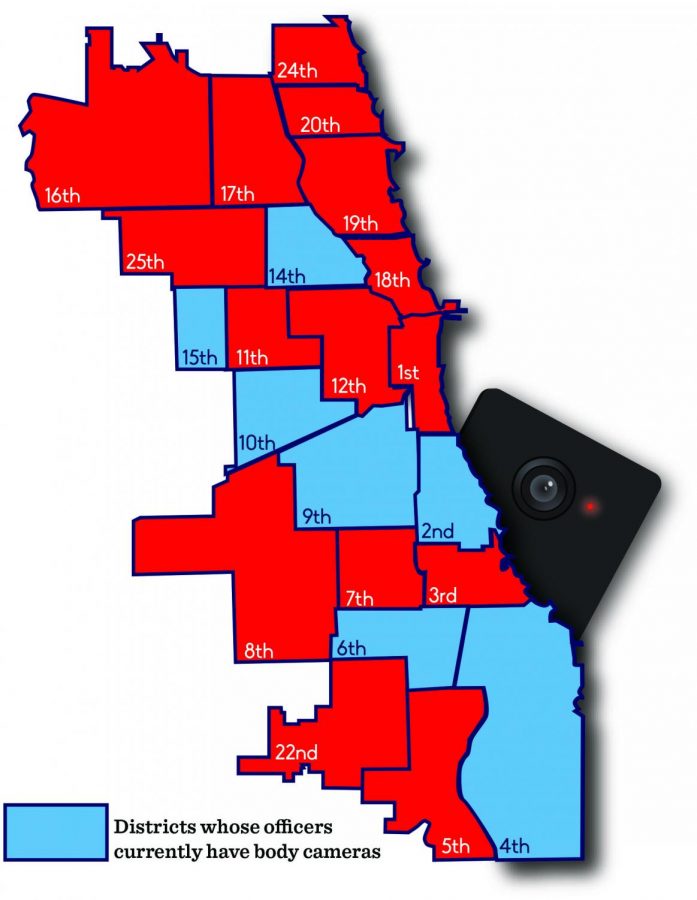Body cameras for all city police officers by 2018
Body cameras for all city police officers by 2018
September 26, 2016
Chicago police officers will be required to wear body cameras while on patrol in all 22 districts within the next two years, according to a Sept. 18 press release from the Chicago Police Department.
The announcement came at the end of the city’s initial body camera pilot, which began in January 2015 in the Shakespeare District and was expanded to Austin, Wentworth, Deering, Ogden South Chicago and Gresham, according to the press release.
In the press release, CPD Superintendent Eddie Johnson called the expansion a “win-win” for both citizens and officers.
“Body-worn cameras provide a rare glimpse into the dangerous situations Chicago police officers face every day in an effort to keep our communities safe,” Johnson said in the press release.
Arthur Lurigio, a criminal justice and psychology professor at Loyola University Chicago, said the expansion is a “two-way street” for civilians and officers.
“Body cameras are not only to protect residents against [over excessive police force] or violations of constitutional rights—[they] can also protect the police against unwarranted or unjustified accusations,” Lurigio said.
However, Lurigio said cameras have a limited capability to hold officers accountable because they do not give a full picture of the scene and only show one point of view.
Body camera footage can help in an investigation but may not capture the proper context and justification for police force, said Robert Lombardo, an associate professor of criminal justice at Loyola.
“There are plenty of examples where [body cameras] have exposed problematic things, but the camera is only a view from one angle,” Lombardo said.
Body cameras are also costly to implement because body camera footage must be maintained until a case it is involved in is closed. The storage cost can also be expensive, Lurigio said.
The Taser Axon cameras will be funded by CPD’s operating budget and grant funding, according to the press release. It lists an estimated cost of about $8 million for an additional 5,000 cameras and technological upgrades.
In comparison, the Los Angeles Police Department signed a 5-year contract with the same company, Taser International, earlier this year for $57.6 million. LA’s plan includes storing the camera’s recording records.
Research on the effectiveness of body cameras is limited as well, Lurigio added. What is available shows a reduction in complaints against the police and result in a reduction of police force.
While Lurigio is in favor of Johnson’s plan, he also wants to see more studies conducted to determine if the investment is cost-effective.
Lurigio added that police training for using body cameras needs to be implemented with tools such as simulations of crime scenes, so patrol officers are knowledgeable about the camera’s functions and become accustomed to wearing them. He said he thinks body cameras will eventually be implemented in all police departments and become part of the uniform. Lurigio said body camera training should begin at the police academy.
“Eventually, I believe every police officer in America will be wearing a body camera,” Lurigio said. “They’ll have their body camera, their firearm, their badge, their radio—it’ll become part of the uniform.
Cindy Greenwood, a member of the Community Renewal Society—a group that informs, trains and organizes communities to advocate social and economic justice—agrees and said she thinks it will only improve trust between CPD and the community.
Body cameras could also make officers self-conscious of their actions and cause hesitation because people act in a different manner when they know they are on camera, Lurigio said.
“What you want to happen is for the police to forget they have a body camera on—only to turn it on and behave the way they would behave generally,” Lurigio said. “So, maybe policing will become more civil and people responding to police officers will also reflect that
enhanced civility.”
Ted Pearson—the co-chairman of the Chicago Alliance Against Racist and Political Repression, a group that advocates for an elected Civilian Police Accountability Council—said he is in favor of the body cameras and being recorded should not be an issue for any effective police officer.
“I can’t imagine why anyone doing their job effectively would be afraid of being recorded,” Pearson said.
Greenwood agrees, adding she does not see how a body camera can prevent police officers from performing their jobs effectively.
“It seems to me that if [a police officer is performing their job] properly, then that’s what the body camera will capture,” Greenwood said. “Why would that impact how they do their job?”
Greenwood said she is concerned about the possibility of patrol officers turning off the cameras while on duty and thinks there should be consequences for those who do.
Drawing comparisons to the city’s July 28 shooting of 19-year-old Paul O’Neal—during which the camera of the officer who shot O’Neal was turned off—Pearson said the program itself is pointless given the current system.
“The officers themselves don’t always keep their cameras on,” Pearson said. “More importantly, if the police are not controlled by a democratic body elected by the people in the community, there’s no guarantee [body cameras] will make any difference at all.”








